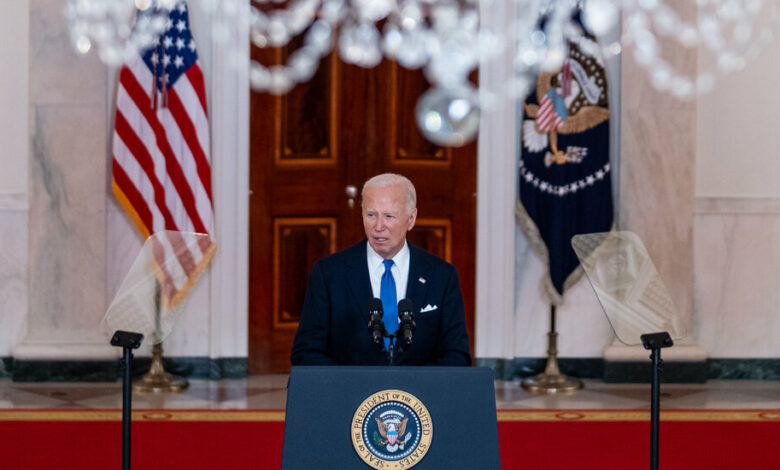Judge orders Biden administration to resume gas export permitting

A federal judge on Monday ordered the Biden administration to resume issuing permits for new liquefied natural gas export facilities. The administration had halted that process in January to analyze how those exports impact climate change, the economy and national security.
The decision of the United States District Court for the Western District of Louisianacomes in response to a lawsuit from 16 Republican state attorneys general, who argued that the pause amounted to a ban that harmed their states’ economies. Many of those states, including Louisiana, West Virginia, Oklahoma, Texas and Wyoming, produce significant amounts of natural gas.
The judge, James D. Cain Jr., appointed by President Donald J. Trump, wrote in his ruling that the states had shown they lost jobs, royalties and taxes that would have flowed in if the gas export permits had continued.
For example, Texas predicted it would lose $259.8 million in tax revenue from natural gas production over five years as a result of the permitting freeze.
Energy Secretary Jennifer Granholm has said she expects her agency’s review of LNG exports to be completed by the end of this year.
But Judge Cain agreed with the attorneys general that the states were being prejudiced.
“The Court finds that the lost or delayed revenues associated with the production of natural gas constitute a concrete and imminent injury supporting the claim,” Judge Cain wrote.
Louisiana Attorney General Elizabeth Murrill said in a statement: “Liquified natural gas has had a tremendous and positive impact on Louisiana, providing clean energy for the world and creating great jobs here at home. The people of Louisiana are proud to power this country and the world. This is a huge win for American energy.”
Angelo Fernández Hernández, a White House spokesman, said the administration was disappointed by the ruling. “We remain committed to informing our decisions with the best available economic and environmental analysis, supported by sound science,” he said in a statement.
The United States is the world’s largest exporter of LNG and, even with the pause, existing capacity is expected to more than double by the end of the decade from projects already approved. The country has seven active terminals and another five under construction. Another 17 projects have applied for permits.
The Biden administration moved in January to halt approvals for new liquefied natural gas facilities after climate activists campaigned against Calcasieu Pass 2, a proposed $10 billion project in Louisiana. If completed, Calcasieu Pass 2 would be the nation’s largest natural gas export terminal and increase the nation’s daily gas exports by about 20 percent. Last week, the Federal Energy Regulatory Commission voted 2-1 to approve the project, making the export terminal’s permit the final hurdle.
The pause also affected five other projects involving gas exports to countries that do not have a free trade agreement with the United States.
The protests over Calcasieu Pass 2 came as President Biden sought to shore up his support among climate activists, a key constituency. Despite signing the most significant climate bill in the nation’s history, young climate activists in particular have been disappointed by his administration’s approval of oil drilling projects like Willow, a massive drilling project in the pristine Alaskan wilderness.
When Biden announced the pause in January, he presented the decision as based on concerns about climate change.
“In every corner of the country and the world, people are suffering the devastating toll of climate change,” Biden said in a statement at the time. “This pause on new LNG approvals sees the climate crisis for what it is: the existential threat of our time.”
Environmental groups on Louisiana’s Gulf Coast, where pollution from LNG plants has affected residents’ health, are calling for an outright ban on new exports.
The pause in permitting pitted oil and gas companies against Biden, industry lobbyists said. Three oil executives held a fundraiser in Houston in May to support Trump, who has promised to restart LNG permitting.
The pause was announced a month after the United States joined nearly 200 countries at a United Nations climate summit pledging to transition away from fossil fuels.
A complicated battle has emerged over the role of LNG as countries try to transition to cleaner energy.
Natural gas, which is mostly methane, is cleaner than coal when burned. But methane is a much more potent greenhouse gas than carbon dioxide in the short term. And it can leak anywhere in the supply chain, from the production well to the processing plants to the stovetop. The process of liquefying the gas so it can be transported is also incredibly energy-intensive, which creates even more emissions.
Biden administration officials did not say Monday night whether they plan to appeal. Any appeal is expected to be heard by the U.S. Court of Appeals for the Fifth Circuit in Louisiana, where several Trump-appointed judges sit. ruled in favor of plaintiffs challenging Mr. Biden’s environmental policies.




